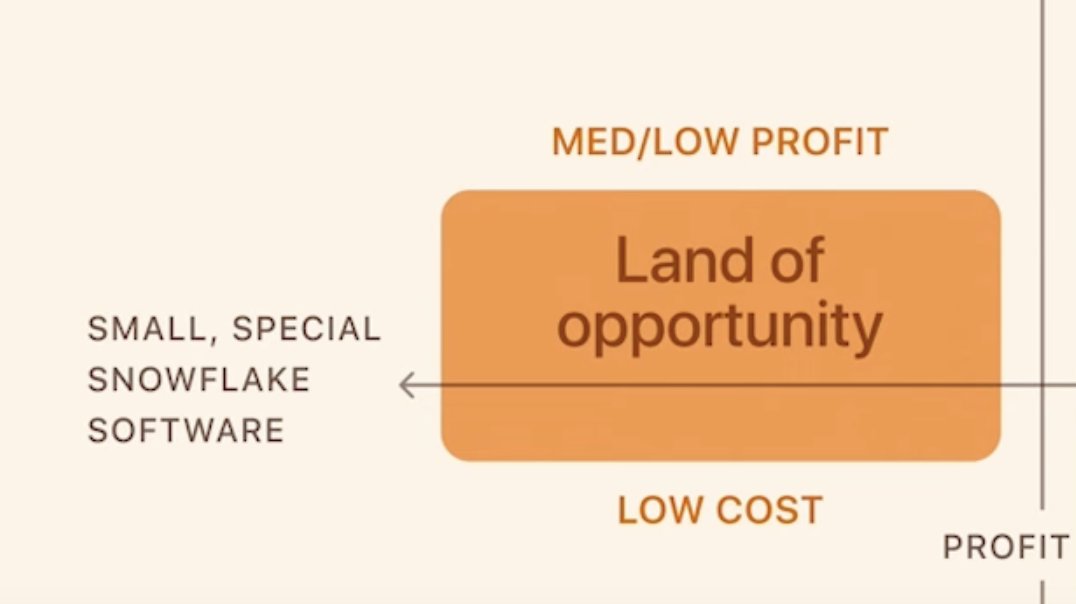@ndyg
Planting /
How do you make a living?
(for tech folks considering an indie path)
This page explores sustainable business models for software developers who specialize in creating tools, automating systems, and building niche services. The focus is on fostering an ecosystem where thousands of smaller, specialized software projects can thrive alongside the dominant tech giants by catering to specific, niche audiences.
If you’ve thoughts on this topic, there’s a discussion going on here.
Updates (the stream, to be incorporated)
2024 Oct 23:
The German government funds open source software development initiatives with its Sovereign Tech Fund
Open Source Pledge urges companies to financially support open source maintainers. Some initial thoughts: good on @sentry and can relying on people to “do the right thing”, for its own sake, work?
2024 Oct 09:
Maggie Appleton’s Land of opportunity
2024 Aug 23:
gitwallet.co is a new project by @tarunsachdeva that aims to help open source developers get paid for their work.
@calebporzio shared he’s passed $1M in revenue with his open source projects.
Epistemic Disclosure
- Root Depth: about a decade.
- Growth Stage: about 4 months.
- Cross-Pollination: untested: feedback appreciated!
- Last updated: 05 Aug 2024
- This page makes more sense if you’re familar with the idea of a digital garden.
- Related plantings: What constitutes a good living?
The omg.lol business model (my current favorite)
My take on this model is, build a community around some fun tools and generally vibes, and charge a token amount to be a participant in the community.
The “open source” business model
Generally, create something useful for many people, gift it to them, then… make a living? This model seems like magical thinking, but it also seems like it just has to work, somehow?
The xkcd comic highlighting how dependent the world is on open source software is now a cliché, but it’s nonetheless obvious.

The world relies on open source, and developers need to make a good living to keep it secure and thriving. Importantly, 20 GitHub sponsors at $5/month is an unserious solution. We need to be thinking in terms of $200K USD per developer per year. So how do we achieve that?
Some projects I’m watching with interest:
- Atuin: a tool to make your shell history searchable. I probably activate Atuin 10s of times an hour on a typical work day. Ellie announced in Jan that she’d quit her job to work on it full time.
- Bruno an open-source IDE for exploring and testing APIs (think lightweight alternative to Postman or Insomnia). Anoop M D’s made an excellent post on the need for sustainable open source.
- Zellij (tbd)
- A tweet by Louis Pilfold, creator of the Gleam programming language, caught my eye: ouch.
The benefactor business model modifier
A barrier to adopting specialized groupware apps is the need for the entire group to adopt the app for it to be usable at all. For example, a chat channel for a family group only works when everyone in the group is able to participate.
The “benefactor business model” aims to address this “all-or-nothing” requirement by having one enthusiastic group member pay for the entire group. In close-knit groups, tech enthusiasts often serve as the community’s tech guides, usually recommending free, ad-supported groupware to avoid financial commitment from others.
This model transforms these enthusiasts into benefactors who cover the subscription fee for the whole group. As a result, the community gains access to a superior, ad-free service without requiring individual members to pay. Benefactors may also receive exclusive tools and features to aid in tech support and community management.
This modifier can be applied to the other business models to overcome adoption barriers in small, close-knit groups.
The “Ben Thompson” business model
Regularly create compelling content that people are willing to pay a subscription for. Ben wasn’t the first to do this, but at least to me, stands out as being very good and successful with it. Substack is a more recent platform that enables this model.
Here are some of my favorite writers who use this model. Of these, my impression is that only Tangle is positioned to make a comfortable living solely from their writing:
Is this model the same as the patronage model?
The SaaS Business Model
Create and host software that provides value to users, who then pay a subscription fee for access. Under the straight SaaS play business model, there are pioneers like Salesforce and behemoths like GitHub, but I think the world is more interesting with thousands of small, niche SaaS providers rather than a few mega services.
I find small indie SaaS projects inspiring, like Waterloo’s @smhanov’s websequencediagrams. Unassuming on the surface, it’s provided Steve a good living since 2012, even with the subsequent competition from the open source Mermaid.
However, I’m really interested in interop, which leads you to local-first, as generally the traditional SaaS’ interests are in conflict with interop. And then, as @Zephraph observed
[…] localfirst goes against the SaaS winds. Most SaaS companies make money by collecting data from a user and massaging it in a way that they control. Stop paying, lose access. Local first turns that on its head.
So what to do there?
